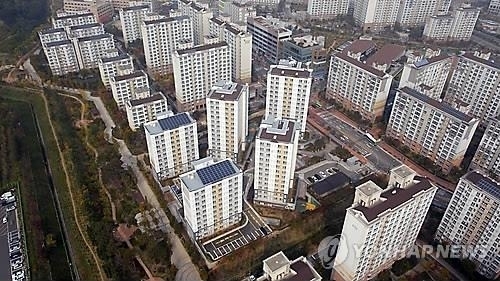Korea’s household debt has recently been increasing in tandem with rising mortgages on the back of relaxed regulations on borrowings and recovery in the housing market, the International Monetary Fund said.
In its regional report assessing Korea’s household debt and housing market, the IMF noted that Korea’s high household debt does not pose a downside risk to the Korean economy, with financial authorities tightening their monitoring of nonbank loans and management of debtors’ repayment capabilities.

Its household debt accounts for 95 percent of the country’s gross domestic product, and mortgages account for 70 percent of the debt.
“The high level of household debt does not seem to be a systemic threat to (Korea’s) macroeconomic or financial stability,” said the IMF.
“The authorities are taking steps to address potential risks stemming from rising household debt.”
Household debt increased by more than 8 percent last year, while mortgages grew over 9 percent in the same period, IMF reported, adding, “The increase in household debt in 2015 was largely driven by increased activity in the housing market and rising house prices.”
However, with a majority of Koreans taking out short-term mortgages and accumulating equities in other financial assets on high personal savings, the debt is manageable.
Also, Korean banks have been increasing their buffers against rising debt and housing prices.
Regulators have taken various measures against household debt growth such as increasing monitoring of indices such as loan qualification ratios of loan-to-value and debt-to-income. Korea has also introduced programs enabling consumers to take out long-term amortizing loans with fixed interest rates and pay down debt as a means to stabilize the market.
“Regulators have tightened the macroprudential policies to address signs of a buildup of systemic risks in the housing sector,” it said.
A number of factors have contributed to rising household debt over the years. Loans to launch small businesses by the baby-boom generation after retirement led the debt to increase, along with increasing prices of jeonse rentals -- Korea’s unique housing financing system allowing tenants to pay a lump-sum deposit receivable after housing contract expires.
By Park Hyong-ki (hkp@heraldcorp.com)
In its regional report assessing Korea’s household debt and housing market, the IMF noted that Korea’s high household debt does not pose a downside risk to the Korean economy, with financial authorities tightening their monitoring of nonbank loans and management of debtors’ repayment capabilities.

Its household debt accounts for 95 percent of the country’s gross domestic product, and mortgages account for 70 percent of the debt.
“The high level of household debt does not seem to be a systemic threat to (Korea’s) macroeconomic or financial stability,” said the IMF.
“The authorities are taking steps to address potential risks stemming from rising household debt.”
Household debt increased by more than 8 percent last year, while mortgages grew over 9 percent in the same period, IMF reported, adding, “The increase in household debt in 2015 was largely driven by increased activity in the housing market and rising house prices.”
However, with a majority of Koreans taking out short-term mortgages and accumulating equities in other financial assets on high personal savings, the debt is manageable.
Also, Korean banks have been increasing their buffers against rising debt and housing prices.
Regulators have taken various measures against household debt growth such as increasing monitoring of indices such as loan qualification ratios of loan-to-value and debt-to-income. Korea has also introduced programs enabling consumers to take out long-term amortizing loans with fixed interest rates and pay down debt as a means to stabilize the market.
“Regulators have tightened the macroprudential policies to address signs of a buildup of systemic risks in the housing sector,” it said.
A number of factors have contributed to rising household debt over the years. Loans to launch small businesses by the baby-boom generation after retirement led the debt to increase, along with increasing prices of jeonse rentals -- Korea’s unique housing financing system allowing tenants to pay a lump-sum deposit receivable after housing contract expires.
By Park Hyong-ki (hkp@heraldcorp.com)







![[Graphic News] More Koreans say they plan long-distance trips this year](http://res.heraldm.com/phpwas/restmb_idxmake.php?idx=644&simg=/content/image/2024/04/17/20240417050828_0.gif&u=)
![[KH Explains] Hyundai's full hybrid edge to pay off amid slow transition to pure EVs](http://res.heraldm.com/phpwas/restmb_idxmake.php?idx=644&simg=/content/image/2024/04/18/20240418050645_0.jpg&u=20240419100350)





![[From the Scene] Monks, Buddhists hail return of remains of Buddhas](http://res.heraldm.com/phpwas/restmb_idxmake.php?idx=652&simg=/content/image/2024/04/19/20240419050617_0.jpg&u=20240419175937)

![[KH Explains] Hyundai's full hybrid edge to pay off amid slow transition to pure EVs](http://res.heraldm.com/phpwas/restmb_idxmake.php?idx=652&simg=/content/image/2024/04/18/20240418050645_0.jpg&u=20240419100350)

![[Today’s K-pop] Illit drops debut single remix](http://res.heraldm.com/phpwas/restmb_idxmake.php?idx=642&simg=/content/image/2024/04/19/20240419050612_0.jpg&u=)